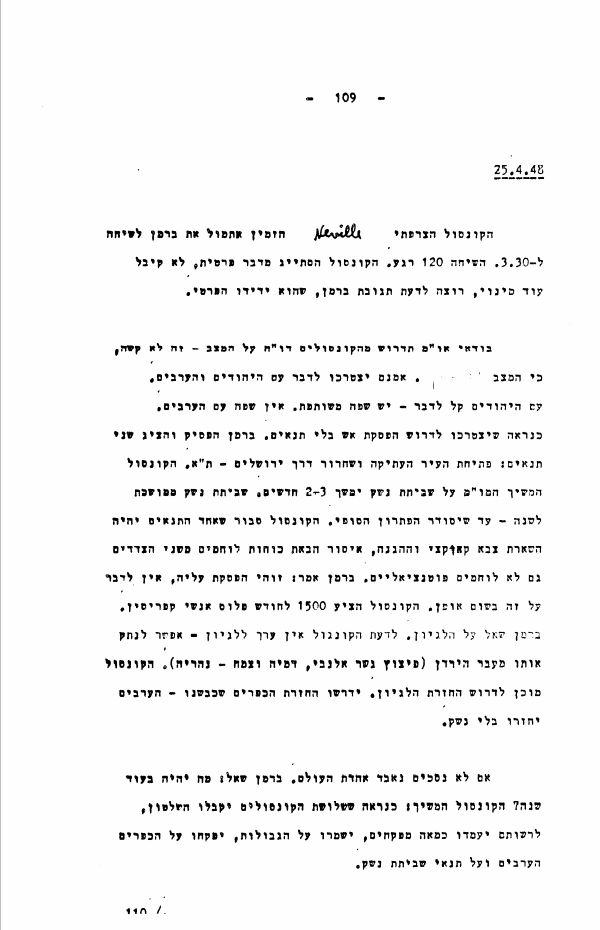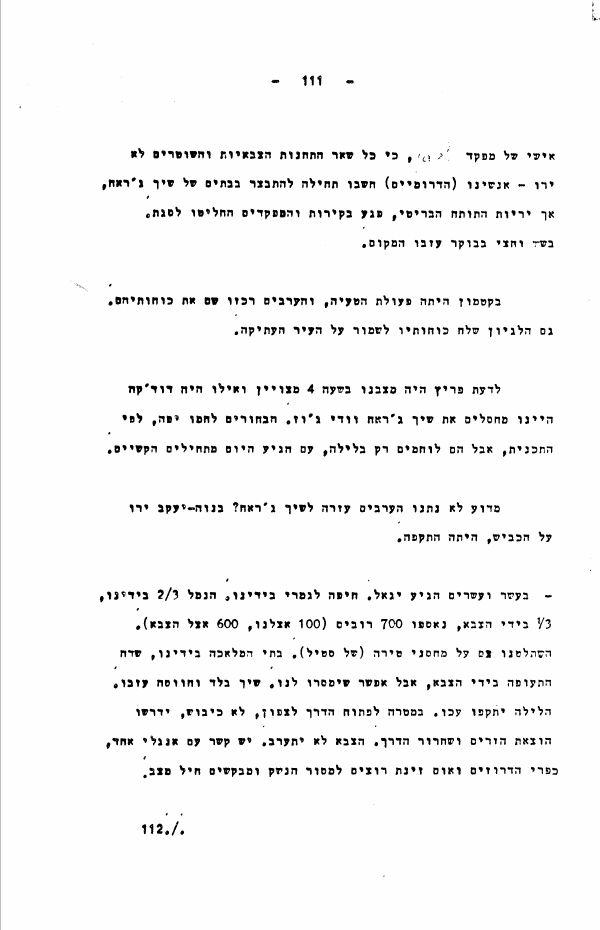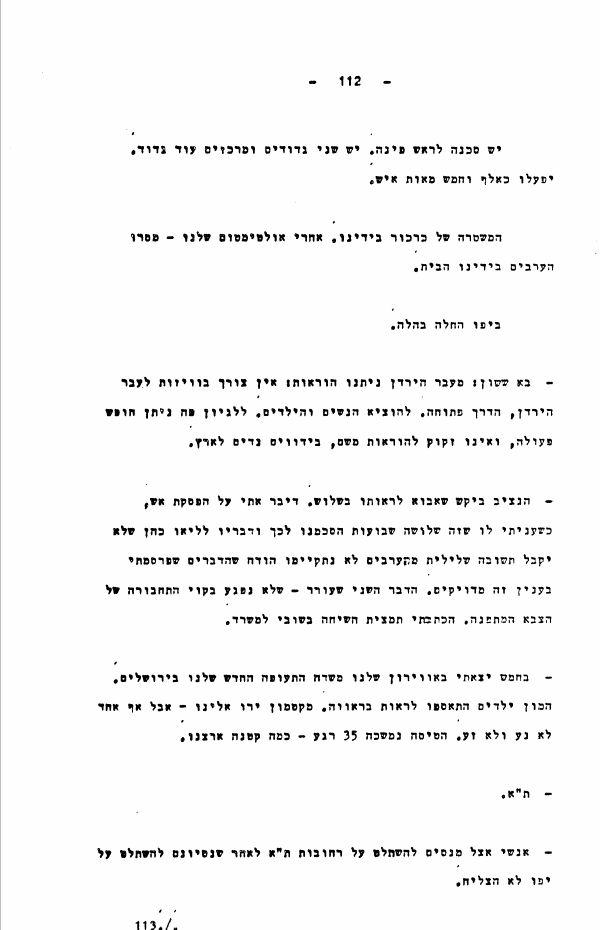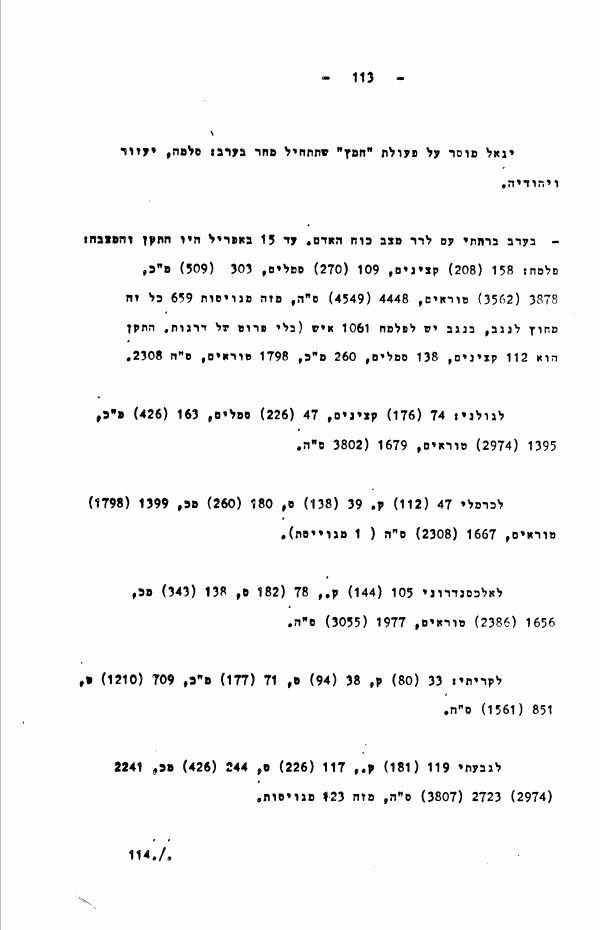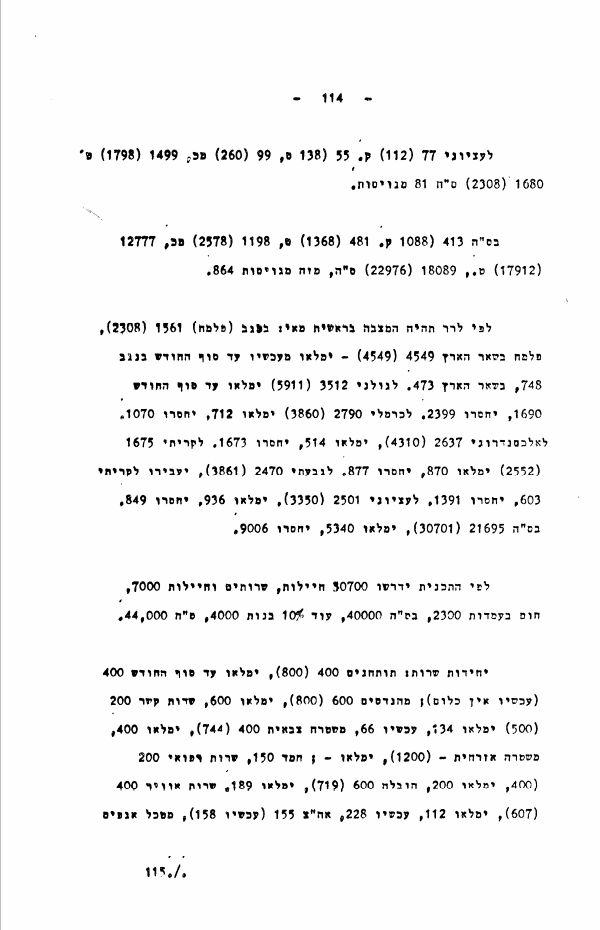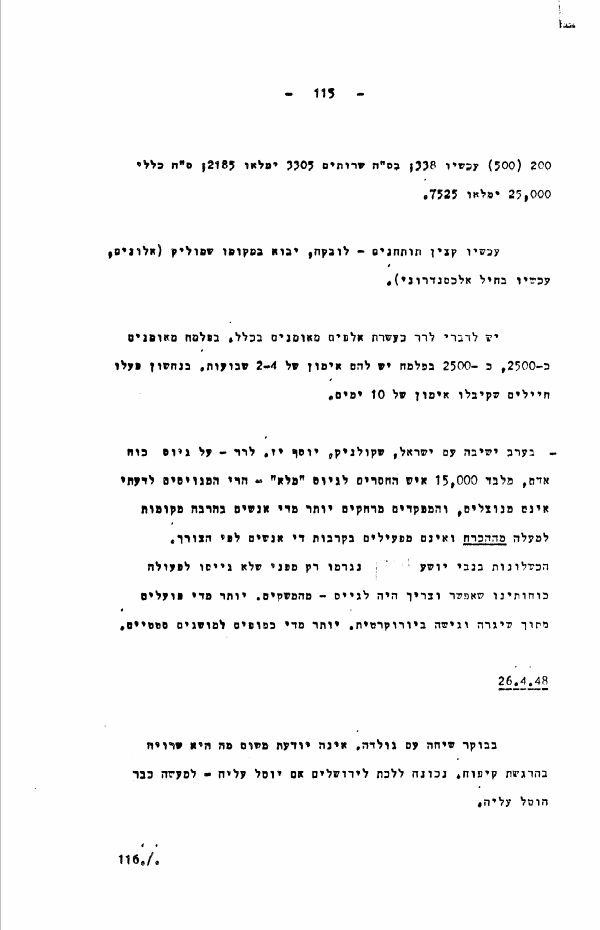1
of
Places:
Tirat Karmel
Haifa
Jerusalem
Naharayim
Nablus
Tira
Elyakim
Dor
Acre
Yazur
Jaffa
Karkur
Rosh Pinna
People:
The use of the photograph is subject to the Copyright Law, 2007
25.04.1948
224007
[Jerusalem] April 25, 1948 Yesterday, the French Consul, [René] Neville, summoned Berman [Haim Radai of the Political Department] for a talk at 3:30. The talk [lasted] 120 minutes, the Consul expressed reservations, speaks privately. Didn’t get another appointment. He wants to know how Berman, his personal friend, responded. The UN will certainly ask for a situation report—it’s not difficult because the situation is impressive [?]. True, they’ll have to speak with the Jews and the Arabs. With the Jews it’s easier—there’s a common language [but] there’s no common language with the Arabs. Evidently they’ll have to demand an unconditional cease-fire. Berman interrupted and presented two conditions: opening up the Old City and freeing the Jerusalem–Tel Aviv road. The Consul continued: the cease-fire negotiations will last 2–3 months—a lengthy year-long cease-fire—until final status is worked out. The consul believes that one of the conditions will be leaving Qawuqji’s army and the Haganah in place, a ban on introducing combat forces from both sides, even potential ones. Berman said: It’s a cease-immigration. We mustn’t talk about it in any manner. The Consul proposes 1,500 [immigrants] per month, plus the Cyprus people. Berman asked about the Legion. In the Consul’s opinion, the Legion is worthless—it can be cut off from Transjordan (blowing up Allenby Bridge, Damya, Tsemah, and Naharayim). The Consul is prepared to demand the pullback of the Legion. They’ll demand the return of the villages that we occupied—the Arabs will return [to them] without weapons. If we don’t agree, we’ll lose the world’s sympathy. Berman asked: What’s going to be a year from now? The Consul continued: It seems that the three consuls will be empowered, they’ll have about a hundred inspectors to call on, they’ll guard the borders [and] watch over the Arab villages and the terms of the cease-fire. In the Consul’s opinion, we made a mistake by not smashing the Arabs in the first four weeks. If we don’t obtain a cease-fire now—the Legion will fight against us, we’ll probably knock it down, the British will send the second legion, and if we defeat it, too—the British themselves may fight us. America will impose an embargo—on food, weapons, and money. - Yadin announced that if the weather is good, he’ll set out at 8:30 a.m. for Jerusalem [by air]. I asked to make the necessary arrangements [for a landing] in Jerusalem. - Fritz: the Sheikh Jarrah plan was only half successful. There were two attacks: from the north, they circumvented the police [school] (the police did not intervene), they approached the Nashashibi house east of the road to Nablus, and from south the Shmuel Navi road from [the] Bet Yisrael [quarter]. After an attack from both sides (at 1:30 a.m.), the Arabs began to flee. The southern force began to blow up the neighborhood. The northern force seized Nashashibi’s palace (and some seventy people have been sitting there since then. They blew up 15–20 houses). Both forces began to approach the crossroads (Nablus–University) where the last line was. At 4:00, the army opened fire from Antonius’ house: two machine guns and light anti-tank artillery. The commanders of the southern force decided then to retreat and took all the wounded. The northern force remained in the Nashashibi house. The southern force had 25 wounded, three seriously. All of them were caused by the army. At Bet Yisrael, one member of the garrison force was killed by gunfire from the army. From the northern force, one was killed and … were wounded (this—by the Arabs). According to signal intelligence, the Arabs sustained heavy losses. Our men also fired on Wadi Joz and losses were caused. In Sheikh Jarrah, a few Arabs still remained. The army’s gunshots from the Antonius house were apparently a personal matter by a hateful commander, because none of the other army and police stations opened fire. Our (southern) people thought at first to barricade themselves in the houses of Sheikh Jarrah, but British artillery rounds damaged the walls and the commanders decided to pull back. At 6:30 they left the place. In Katamon, a feint took place and the Arabs massed their forces there. The Legion also sent its forces to watch over the Old City. In Fritz’s opinion, our situation at 4:00 was excellent and if there had been a Davidka, we would have wiped out Sheikh Jarrah and Wadi Joz. The men fought well, according to the plan, but they fight only at night; when day breaks, the difficulties begin. Why didn’t the Arbs give assistance to Sheikh Jarrah? From Neve Ya’akov they fired at the road. There was an attack…. - At 10:20 Yigael [Yadin] arrived. Haifa is totally in our hands. The port 2/3 in our hands, 1/3 in the army’s hands. 700 rifles were collected (100 are with us, 600 with the army. We also took over the Tira [Tirat Hacarmel] warehouses (of Stil). The workshops (of the British Army) are in our hands, the airfield is in the army’s hands but they may hand it over to us. [The Arabs of] Balad-a-Sheikh and Hawassa [today—Tel Hanan and the Ben-Dor neighborhood] left. Tonight [Palmach forces] will attack Acre—in order to open a way to the north, not to occupy [the city]; to do it, it’ll be necessary to remove the foreigners and free up the road. The army will not intervene. There’s contact with one of the British. The Druze villages [on Mount Carmel] and Umm az-Zinat [near Elyakim Junction] want to surrender [their] weapons and want a garrison force [in their villages]. Rosh Pinna is in danger. [We have] two battalions there and are massing another battalion [Yiftah Brigade]. About one thousand five hundred men will operate there. The Karkur police [station] is in our hands. After our ultimatum, the Arabs surrendered the building to us. In Jaffa, panic has begun. - Sasson came: In Transjordan, instructions were given: [the Arabs of Palestine] do not need visas to Transjordan, the way to removing the women and children is open. The Legion here has been given freedom of action and needs no instructions from there. Bedouin are migrating toward our country. - The High Commissioner asked me to visit him at three. He spoke with me about a cease-fire. When I answered that we’ve been agreeing to it for three weeks and what he told Leo Cohen, that he wouldn’t take no for an answer from the Arabs, didn’t come to pass. He admitted that the remarks I had published about the matter are accurate. The second thing that came up—that we shouldn’t hit the transport lines of the vacating army. I dictated the gist of the talk when I returned to the office. - At five, I took off on our aircraft from the new airfield in Jerusalem. A crowd of children gathered to see the spectacle. From Katamon, they fired at us—but none of the kids moved an inch. The flight lasted 35 minutes—how small our country is…. - Tel Aviv. IZL people are trying to capture the streets of Tel Aviv after their attempt to capture Jaffa failed. - Yigael [Yadin] reports on Operation Hametz, which will begin tomorrow evening: [to occupy] Salameh, Yazur, and Yehudiyya. - In the evening I inquired with Lehrer [Moshe Zadok] about the manpower situation. Up to April 15, full-strength and available manpower were the following: Palmach 158 (208) officers, 109 (270) sergeants, 303 (509) sc [squad commanders] 3378 (3562) privates, 4448 (4549) total, thereof: 659 inducted, all of this apart from the Negev. In the Negev, the Palmach has 1061 men (without a breakdown of ranks). The standard is 112 officers, 138 sergeants, 260 sc, 1798 privates, total 2308. Golani: 74 (176) officers, 47 (226) sergeants, 163 (426) sc, 1395 (2974) privates, 1679 (total 3802). Carmeli has 47 (112) o[fficers], 39 (138) s[ergeants], 180 (260) sc, 1399 (1798) privates, 1667 (2308) total (1 mobilized) Alexandroni has 105 (144) o, 78 (182) s, 138 (343) sc, 1656 (2386) privates, 1977 (3055) total. Kiriati has 33 (80) o, 38 (94) s, 71 (177) sc, 709 (1210) p, 851 (1561) total. Givati has 119 (181) o. 117 (226) s, 244 (426) sc, 2241 (2974) 2723 (3807) total, thereof 123 mobilized. Etsiyyoni has 77 (112) o, 55 (138) s, 99 (260) sc, 1499 (1798) p 1680 (2308) total, 81 mobilized. Total 415 (1088) o, 481 (368) s, 1198 (2578) sc, 12777 (17912) p, 18089 (22976) total, thereof 864 mobilized. According to Lehrer, the following will be on hand at the beginning of May: in the Negev (Palmach) 1561 (2308), Palmach in the rest of the country 4549 (4549)—748 will fill in from now to month’s end in the Negev, 473 in the rest of the country. Golani 3512 (5911)—filled in by month’s end 1690, shortfall 2399. Carmeli 2790 (3860) 712 filled in, shortfall 1070. Alexandroni 2637 (4310), 514 filled in, shortfall 1673. Kiriati 1675 (2552) to be filled in 870, shortfall 877. Givati 2470 (3861), to be transferred to Kiriati 603, shortfall 1391, Etsiyyoni 2501 (3350) 936 to be filled in, shortfall 849, total 21693 (30701), 5340 to be filled in, shortfall 9006. According to the plan, 30,700 soldiers will be needed [for the brigades]; services and [professional] corps 7,000, garrison forces at the positions 2,300, total 40,000, another 10% girls—4,000, total 44,000. [Available manpower and standard for] service units [as of the beginning of May]: artillery 400 (800), 400 to be filled in by month’s end (now there’s nothing [to fill in with]); engineers 600 (800)—600 to be filled in [sic; the correct number is 200); Signal Service 200 (500), 134 to be filled in, now 66; military police 400 (744), 400 to be filled in. Civilian police—(1,200). To be filled in—[blank]; Science Corps 150; Medical Service 2000 (400), 200 to be filled in; transport 600 (719), 189 to be filled in; Air Service 400 (607), 112 to be filled in, now 228; Training Division 155 (now 158), General Staff (divisions) 200 (500), now 338; total services 3,30 5, 2,185 to be filled in; grand total 25,000, 7,525 to be filled in. Artillery officer now—Lubke [Yehuda Ginsburg]. Shmuel [Shmuel Admon] of [Kibbutz] Alonim, now in the Alexandroni corps), will replace him. According to Lehrer, some ten thousand have training, total. In the Palmach, 2,500 [and another] 2,500 or so [privates]. The Palmach gives 2–4 weeks of training. Soldiers who received ten days of training took part in [Operation] Nahshon. - In the evening, a meeting with Yisrael [Galili], Shkolnik [Eshkol], Yosef Yizraeli, Lehrer [Zadok]—about mobilizing personnel. Apart from being 15,000 men short of “full” mobilization—those mobilized, in my opinion, are not being utilized, and the commanders are pinning down too many men in too many places beyond what’s necessary and are not sending enough men into battles as are needed. The failures in Nebi Yusha and Zar’in happened only because our forces that could and should have been mobilized—from the kibbutzim—were not mobilized for the operation. Too many men are sticking to routine and taking a bureaucratic approach. Too many are subordinate to static concepts.





